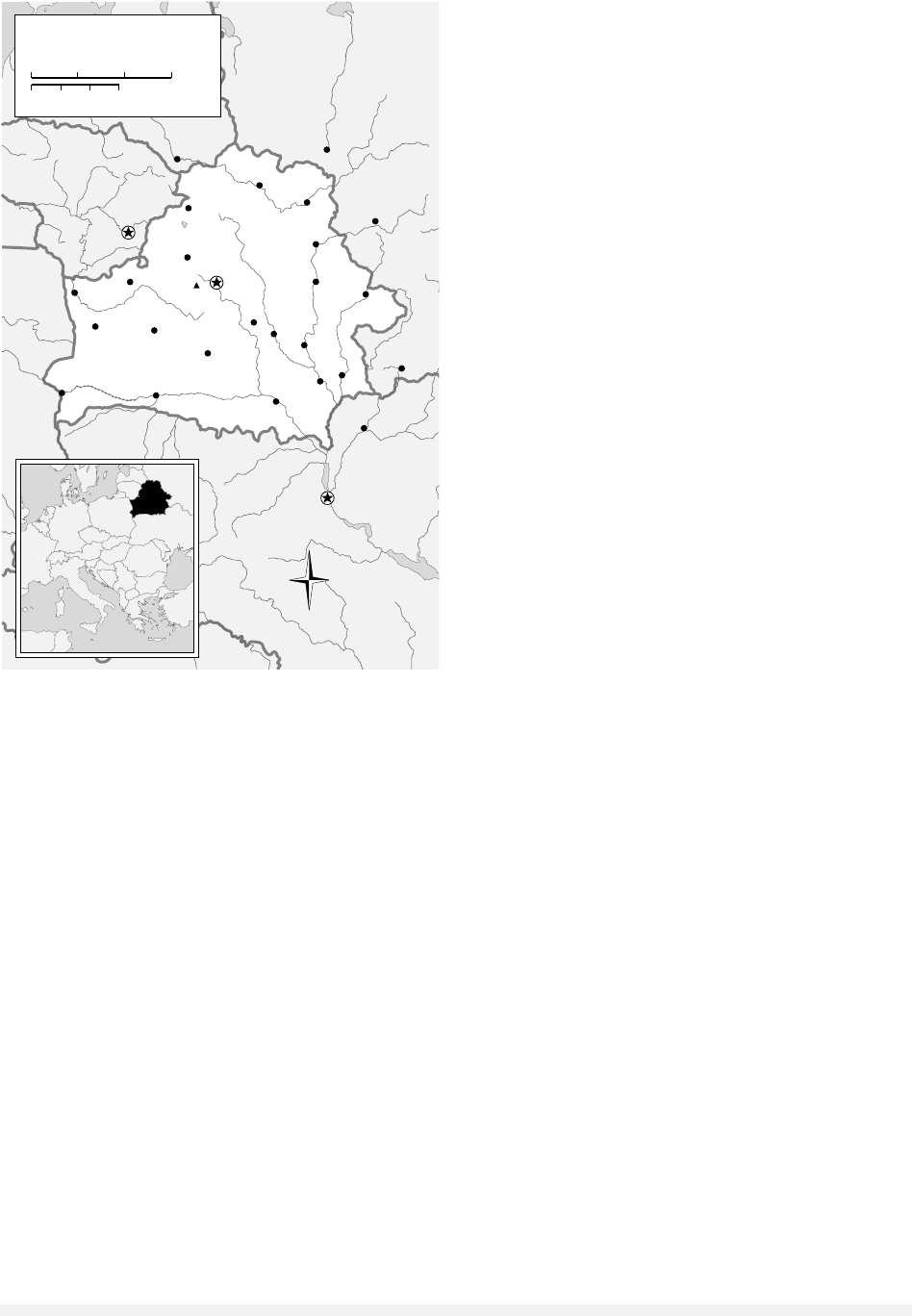Encyclopedia of Russian History
Подождите немного. Документ загружается.


Jasny, Naum. (1972). Soviet Economists of the Twenties.
Cambridge, UK: Cambridge University Press.
V
INCENT
B
ARNETT
BEARD TAX
The beard tax is the best known of a series of mea-
sures enacted by Tsar Peter I to transform and reg-
ulate the appearance of his subjects. As early as
1698 the tsar ordered many of his prominent
courtiers to shave their beards, and in 1699 he be-
gan to mandate the wearing of European fashions
at court functions. In subsequent years a series of
regulations ordered various groups to adopt Ger-
man (i.e., European) dress. In 1705 decrees were is-
sued prohibiting the buying, selling, and wearing
of Russian dress by courtiers, state servitors, and
townspeople. In the same year the wearing of
beards, which was favored by Orthodox doctrine,
was prohibited and the beard tax was instituted.
With the exception of the Orthodox clergy, anyone
who wanted to wear a beard was ordered to pay a
special tax and obtain a token (znak) from gov-
ernment officials. Although no extensive studies
have examined the implementation of the beard tax
and related decrees, the fact that they had to be re-
peated upon subsequent occasions would indicate
that compliance was far from universal. Old Be-
lievers (Orthodox Church members who rejected
reforms in ritual and practice) were disproportion-
ately affected by the beard tax and they alone were
ordered by law to wear old-style Russian dress (to
separate them from the mainstream of society). The
beard tax was never a major component of state
revenue, and by the reign of Catherine II even the
regulations on Old Believers began to be relaxed.
See also: OLD BELIEVERS; PETER I; TAXES
BIBLIOGRAPHY
Hughes, Lindsey. (1998). Russia in the Age of Peter the
Great. New Haven, CT: Yale University Press.
B
RIAN
B
OECK
BEDNYAKI
A traditional Russian term denoting a poor peas-
ant household, one without enough land or capi-
tal to support itself without hiring out family
members to work on neighbors’ fields.
During the Black Repartition, which occurred
during the revolutionary events of 1917 and 1918,
Russian peasants seized land owned by noble and
absentee landlords and the more substantial peas-
ants, some of whom had consolidated holdings
during the Stolypin reforms of 1906–1914. Thus
the number of peasant holdings increased markedly,
and the size of the average plot declined. Many vil-
lages returned to the scattered strips and primitive
tools characteristic of tsarist times. Use of the
wooden plow, sickle, or scythe were common
among the poorer peasants. These subsistence agri-
culturists typically had one cow or draft animal,
along with a small wooden house and naturally
had little or nothing to sell in the market. Many
poor peasants had been proletarian otkhodniki (mi-
grants) or soldiers before and during the war, but
the economic collapse forced them to return to their
ancestral villages. The village community (ob-
shchina or mir) resumed its authority over the tim-
ing of agricultural tasks and occasional repartition.
Hence the Bolshevik Revolution constituted a social
and economic retrogression in the countryside.
Considering their economic plight, the bed-
nyaki, along with the landless batraki, were ex-
pected to be rural allies of the proletariat. According
to Bolshevik thinking in the period of War Com-
munism and the New Economic Policy, these lower
classes would support the government’s policy and
would eventually be absorbed into collective or
communal farms. Those middle peasants (sered-
nyaki) with slightly more land and productive cap-
ital were expected to tolerate Bolshevik policy only,
while the so-called kulaks would oppose it. In re-
ality the various peasant strata lacked any strong
class lines or reliable political orientation.
See also: BLACK REPARTITION; KULAKS; NEW ECONOMIC
POLICY; PEASANTRY; SEREDNYAKI; WAR COMMUNISM
BIBLIOGRAPHY
Lewin, Moshe. (1968). Russian Peasants and Soviet Power:
A Study of Collectivization, tr. Irene Nove and John
Biggart. London: Allen and Unwin.
M
ARTIN
C. S
PECHLER
BELARUS AND BELARUSIANS
Bounded by Poland, Lithuania, Latvia, Russia, and
Ukraine, Belarus is an independent country of
about the size of Kansas. In 2000 its population
was about 10.5 million. Over the course of its
BELARUS AND BELARUSIANS
133
ENCYCLOPEDIA OF RUSSIAN HISTORY

history, this territory has been of part of Kievan
Rus, the Grand Principality of Lithuania, Poland-
Lithuania, the Russian Empire, interwar Poland
(western Belarus only), and the Soviet Union.
The origin of the name Belarus is obscure. Its
territory, encompassing much of the drainage sys-
tems of the Pripyat River and upper reaches of the
Nieman, Western Dvina, and Dnieper Rivers, com-
prises the medieval Polotsk and Turov principali-
ties, with the addition of the western lands of
Smolensk and Chernigov around Mogilev and
Gomel, but minus the territory south of Pinsk.
Some specialists consider the forests and
swamps of southwestern Belarus part of the orig-
inal homeland of Slavic speakers and possibly the
Indo-Europeans. Baltic speakers inhabited much of
Belarus before Slavic speakers migrated there after
500 C.E. Around 900 the Slavic Dregovichi and
Radmichi inhabited the eastern half of Belarus,
while Baltic Iatvingians dwelled in the northwest.
Specialists’ opinions differ as to when and where a
distinct Belarusian language and people formed and
the degree to which they represent a Baltic and east-
ern Slavic mixture.
Around 980 Polotsk was under a separate
Varangian prince, the non-Riurikid Rogvolod, whom
Vladimir of Novgorod slew en route to seizing Kiev.
Vladimir’s son Iziaslav, by Rogvolod’s daughter
Ragneda, founded there the first lasting Rus terri-
torial subdynasty, and the latter’s son and grand-
son, Briachislav and Vseslav Briachislavich (d.
1101), built up Polotsk. Vseslav’s granddaughter
St. Evfrosynia founded a noted convent there.
In the 1100s Polotsk split into subprincipalities
and by 1200 Volhynia controlled the Brest region,
while Germans were eliminating Polotsk’s tradi-
tional loose overlordship over the tribes of modern
Latvia. In the early 1200s the Smolensk princes
spearheaded commercial agreements with the Baltic
Germans and Gotland Swedes, which included
Vitebsk and Polotsk.
By the mid-1200s, Lithuanian princes—some
Orthodox Christians, some pagans controlled—
Polotsk, Novogrudok, and nearby towns. With the
pagan Lithuanian absorption of all the former
Polotsk and Turov lands in the 1300s, the surviv-
ing local Rus princes transformed into territorial
aristocrats. Rus institutions spread into ethnic
Lithuania, and Rus became the domestic chancery
language of the ethnically mixed realm. For about
half of the fourteenth century, a separate Western
Rus metropolitanate was located in Novogrudok.
Minsk grew in importance at this time near the di-
vide between the Nieman and Dnieper watersheds.
The Orthodox Lithuanian prince Andrei of Polotsk
(d. 1399) fought at Kulikovo against Mamai in
1380.
The 1385 Polish-Lithuanian dynastic Union of
Krevo (in western Belarus) privileged nobles who
converted to Catholicism. After a civil war in the
1430s, the local Orthodox Rus nobility obtained
these same, Polish-inspired rights, but Orthodox
prelates never acquired the same political privileges
as their Catholic counterparts. Starting with Brest
in 1390, several Rus towns obtained a form of
Neumarkt-Magdeburg, the most prevalent form of
medieval autonomous city law to spread into east-
central Europe. After the misfired Church Union of
Florence of 1439, Moscow’s authority split with
the metropolitanate of Kiev, which retained the dio-
ceses in Belarus.
BELARUS AND BELARUSIANS
134
ENCYCLOPEDIA OF RUSSIAN HISTORY
Dzerzhinskaya Gora
1,135 ft.
346 m.
Pinsk Marsh
B
E
L
O
R
U
S
S
K
Y
A
G
R
Y
A
D
A
P
r
i
p
y
a
t
s
'
B
u
g
N
y
o
m
a
n
.
P
t
s
i
c
h
D
n
i
e
p
e
r
B
y
a
r
e
z
i
n
a
S
o
z
h
Z
a
c
h
D
v
i
n
a
D
y
n
a
p
r
o
w
s
k
a
-
B
u
h
s
k
i
K
a
n
a
l
Pinsk
Mazyr
Rechitsa
Bryansk
Chernihiv
Krychaw
Smolensk
Zhlobin
Babruysk
Salihorsk
Asipovichy
Baranavichy
Lida
Vawkavysk
Maladzyechna
Polatsk
Orsha
Velikye Luki
Pastavy
Daugavpils
Brest
Homyel'
Mahilyow
Vitsyebsk
Hrodna
Minsk
Vilnius
Kiev
LITHUANIA
RUSSIA
UKRAINE
POLAND
LATVIA
Belarus
W
S
N
E
BELARUS
150 Miles
0
0
150 Kilometers
10050
50 100
Belarus, 1992. © M
ARYLAND
C
ARTOGRAPHICS
. R
EPRINTED WITH
PERMISSION

With the dynastic union, some Rus acquired a
genuine Western education, and Rus writers cre-
ated a set of Lithuanian chronicles with a legendary
foundation of the leading families and the realm.
Jewish culture flourished, and some holy scripture
and other Jewish books were translated directly
from Hebrew into the local Rus dialect. In 1517
Frantishek Skoryna of Polotsk initiated systematic
Kirillic and Slavic printing with his Gospels.
During the 1500s, with growing estate agri-
culture, a form of serfdom binding peasants to the
land with about two days of labor dues per week
became the dominant peasant status, but the Rus-
language First Lithuanian Statute of 1529 was one
of the most advanced law codes in Europe at that
time. Moscow’s occupation of Polotsk in 1563 led
to the stronger Polish-Lithuanian Union of Lublin
in 1569, whereby Lithuania transferred its Ukrain-
ian lands to Poland, but retained the Belarusian ter-
ritories. The brilliant, Orthodox-turned-Catholic
Leo Sapieha (Leu Sapega) compiled the Rus-
language Third Lithuanian Statute in 1588, which
remained in use for more than two centuries. He
also organized the renowned state archive or
Metrika.
Under the impact of the Protestant Reforma-
tion, the Lithuanian Radvilas (Radzivil) family
turned their central Belarusian fortress town of
Nesvizh into a center of Calvinist learning and
printing, but with the arrival of the Counter Re-
formation, Nesvizh became a Roman Catholic
stronghold. Jesuits founded schools there and in six
other Belarusian towns and helped cause the polo-
nization of the local Rus nobility.
In 1596 the Polish crown, but not the Sejm
(parliament), tried to force the Church Union of
Brest on the Orthodox in 1596, creating at first an
Eastern Rite Uniate hierarchy without many faith-
ful, and leaving most of the faithful without a hi-
erarchy. Over the course of time, however, the
Uniate Church grew and a Catholic-influenced Uni-
ate Basilian Order of monks took over the great
monasteries in Belarus. In 1623 angry Vitebsk Or-
thodox murdered their fanatic Uniate bishop Iosafat
Kunchvich, who had confiscated their churches and
monasteries, and the crown responded with mass
executions. In 1634 the Orthodox Church regained
its legality but not much property. Some talented
Orthodox clerics, such as Simeon Polotsky
(1629–1680), made splendid careers in Moscow. A
1697 decree banned the use of Rus in official state
documents. By the late eighteenth century, the Uni-
ate Church was far stronger than the Orthodox in
Belarus and in the western regions many com-
moners had become Roman Catholic.
Belarusians constituted perhaps one-eighth of
the insurgents in the mid-seventeenth century who
rebelled against the serfdom and Catholic-Uniate
privileges in Poland-Lithuania, but then suffered
heavily from the Muscovite invasions in 1654–1655
and 1659. Ethnic Belarus urban life declined, and
Jews, despite some heavy losses in the uprisings,
became more prominent in many towns. Brest,
however, lost its regional cultural preeminence
among the Litvak Jews to Vilnius in Lithuania.
The Belarus lands suffered again during the
Great Northern War, especially during the period
from 1706 to 1708, due to the Swedish-Russian
fighting there. Later in the eighteenth century the
economy recovered, stimulated by domestic and in-
ternational markets and led by enlightened estate
management and manufactures.
Polish-language serf theaters appeared in 1745,
and Poland’s educational reforms of 1773 estab-
lished an ascending network, with divisional
schools in Brest, Grodno, and Novogrudok, and a
university in Vilnius. Several Belarusians were ac-
tive in the Polish Enlightenment.
The three-stage annexation of Belarus by Rus-
sia during the partitions of Poland (1772, 1793,
1795) had profound effects. The emperors respected
Polish culture and educational and religious insti-
tutions only until the Polish uprising of 1830–1831.
Subsequently, cooperative Belarusians played a
major role in weakening Catholicism, suppressing
the Uniate Church, restoring Orthodoxy and Rus-
sianizing education, as well as publishing histori-
cal documents and doing normal administrative
work.
Though not a main center of heavy industry,
Belarus shared in the Russian Empire’s social and
economic development in the nineteenth century
and had many small enterprises.
Belarusian national consciousness developed
relatively late. Polish and Polish-language intellec-
tuals promoted the idea of a separate, non-Russian,
Belarusian (or White Ruthenian) folk. After Belaru-
sians did not support Poles in the 1863–1864
uprising, interested Russians became more sympa-
thetic to the notion of Belarusians as a distinct
provincial group and started to collect local folk-
lore. Genuine Belarusian-language literature started
only in the 1880s. Circles of Belarusian students
and intellectuals in St. Petersburg, Moscow, Dor-
pat, and other university cities sprung up in the
BELARUS AND BELARUSIANS
135
ENCYCLOPEDIA OF RUSSIAN HISTORY

1890s. Only after the Revolution of 1905 was pub-
lication in Belarusian legalized. Hramada, the so-
cialist and largest Belarusian political organization,
could not compete with the more developed Russ-
ian, Polish, and Jewish parties or elect a delegate to
any of the four Dumas.
The German advances and defeat in World War
I and the Russian Revolution and Civil War stim-
ulated a dozen competing projects for reorganizing
Belarus, including a restoration of a federated
prepartition Lithuania and/or Poland. The revived
Poland and Communist Russia divided Belarus in
1921, the eastern portion becoming the Belarusian
Soviet Socialist Republic (BSSR) of the USSR in
1923–1924. In western Belarus, Polish authorities
favored polonization, suppressing a variety of na-
tional and autonomist strivings. The BSSR author-
ities, including Russians there, at first promoted
belarusianization of domestic life, and national,
cultural, and educational institutions grew apace,
including a university and academy of sciences in
the capital Minsk. However, the rhythms of inter-
war Soviet development—New Economic Policy,
collectivization, five-year plans, bloody purges, and
reorientation to a Russian-language—dominated
all-union patriotism—affected the BSSR.
The Soviet-German Pact of 1939 and World
War II brought a quick unification of an expanded
BSSR, a harsh Nazi occupation and requisition of
labor, the extermination of most Belarusian Jews,
widespread partisan activity, and the total death of
maybe a million inhabitants—about one eighth of
the population. Allied diplomacy resulted in the
BSSR (and the Ukrainian Soviet Socialist Republic)
acquiring a separate seat in the United Nations Gen-
eral Assembly in 1945.
The BSSR also followed the rhythm of postwar
Soviet developments, becoming heavily industrial-
ized with its own specialty tractors and heavy-duty
trucks, as well as a variety of other basic goods.
The country achieved virtual universal literacy, but
the Russian language and culture predominated in
the cities and in higher education. Due to prevail-
ing winds, Belarus suffered heavily from the Cher-
nobyl explosion in 1986.
The BSSR played a secondary role in reform and
national movements leading to the end of the USSR
and an independent Belarus. Its first leader, Stanislav
Shushkevich tried to balance between Russia and the
West, but lost the 1994 presidential election to the
Alexander Lukashenko, who proved adept in using
referendum tactics and police measures to establish
an authoritarian regime with a neo-Soviet orienta-
tion, and perpetuate his power. Dependence on
Russian energy resources and markets have ce-
mented close ties, but plans for a state union with
Russia have faltered over Russian demands that Be-
larus liberalize its economy and Lukashenko’s in-
sistence that Belarus be an equal partner.
See also: CHERNOBYL; JEWS; LITHUANIA AND LITHUANI-
ANS; NAZI-SOVIET PACT OF 1939; ORTHODOXY;
POLAND; POLISH REBELLION OF 1863; UNIATE CHURCH;
UNION OF SOVIET SOCIALIST REPUBLICS
BIBLIOGRAPHY
Marples, David R. (1999). Belarus. A Denationalized Na-
tion. Amsterdam: Harwood Academic.
Vakar, Jan. (1956). Belorussia. The Making of a Nation, a
Case Study. Cambridge, MA: Harvard University
Press.
Zaprudnik, Jan. (1993). Belarus: At a Crossroads in His-
tory. Boulder, CO: Westview Press.
D
AVID
M. G
OLDFRANK
BELINSKY, VISSARION GRIGORIEVICH
(1811–1848), Russian literary critic whose frame-
work of aesthetic judgment influenced Russian and
Soviet critical standards for almost two centuries;
he established a symbiotic relationship between the
writer and the critic whose creative interaction he
considered a tool of societal self-exploration.
Belinsky’s father was a navy physician, his
mother a sailor’s daughter, making the future critic
a raznochinets (person of mixed class background).
He was born in the fortress of Sveaborg (today
Suomenlinna, Finland) and spent his childhood in
the town of Chembar (Penza region), where his fa-
ther worked as a district doctor. Belinsky enrolled
at Moscow University in 1829 but was expelled in
1832 due to frail health and a reputation as a trou-
blemaker. Often on the verge of poverty and de-
pendent on the support of devoted friends, Belinsky
became a critic for Nikolai Ivanovich Nadezhdin’s
journals, Telescope and Molva, in 1834. His exten-
sive debut, Literaturnye mechtaniya: Elegiya v proze
(Literary Daydreams: An Elegy in Prose), consisted
of ten chapters. At this stage, Belinsky’s under-
standing of literature featured a lofty idealism in-
spired by Friedrich Schiller, as well as the notion of
popular spirit (narodnost), which signified the ne-
cessity of the “idea of the people” in any work of
art. This concept was adopted from the German
BELINSKY, VISSARION GRIGORIEVICH
136
ENCYCLOPEDIA OF RUSSIAN HISTORY

Volkstuemlichkeit that was developed by Johann
Gottfried Herder and Friedrich Wilhelm Schelling.
Belinsky’s participation, since 1833, in Nikolai
Vladimirovich Stankevich’s Moscow Hegelian cir-
cle, as well as his close friendship with Mikhail
Alexandrovich Bakunin, had by 1837 caused him
to make a radical move toward an unconditional
acceptance of all reality as reasonable. However, Be-
linsky’s habitual tendency toward extremes turned
his interpretation of Georg Wilhelm Friedrich
Hegel’s dialectic rationalism into a passive accep-
tance of everything that exists, even serfdom and
the tsarist system. Such fatalism became evident in
Belinsky’s surveys and reviews for Andrei Alexan-
drovich Kraevsky’s journal Otechestvennye zapiski
(Notes of the fatherland), the criticism department
of which he headed since 1839. Subsequently, in
the early 1840s, a more balanced synthesis of
utopian aspirations and realistic norms emerged in
Belinsky’s views, as evidenced by his contributions
for Nikolai Alexeyevich Nekrasov’s and Ivan
Ivanovich Panaev’s Sovremennik (Contemporary), a
journal that had hired him in 1846.
Belinsky met all leading Russian authors of his
day, from Alexander Sergeyevich Pushkin and
Mikhail Yurievich Lermontov to Ivan Andreyevich
Krylov and Ivan Sergeyevich Turgenev, befriending
and deeply influencing many of them. In 1846, he
coined the critical term Natural School, thereby pro-
viding a group of writers with direction and a plat-
form for self-identification. Even those who did not
share his strong liberal persuasions were in awe
of his personal integrity, honesty, and selflessness.
Belinsky’s passionate, uncompromising nature
caused clashes that gave rise to major intellectual
debates. For example, in his famous letter to Niko-
lai Vasilievich Gogol, written on July 15, 1847, the
critic took this once so admired writer to task for
his mysticism and conservatism; the letter then cir-
culated widely, in hundreds of illegal copies.
In his last years, Belinsky attempted to create
a theory of literary genres and general philosoph-
ical definitions of the essence and function of art.
After his early death from tuberculosis, his name
became synonymous with dogmatism and anti-
aesthetic utilitarianism. Yet this reputation is
largely undeserved; for it resulted from the critic’s
canonization by liberal and Marxist ideologues.
Still, from his earliest works Belinsky did betray a
certain disposition toward simplification and sys-
tematization at any cost, often reducing complex
entities to binary concepts (e.g., the classic opposi-
tion of form versus content). Indeed, Belinsky de-
voted little time to matters of literary language,
rarely engaging in detailed textual analysis. How-
ever, his theories and their evolution, too, were
simplified, both by his Soviet epigones and their
Western antagonists.
Belinsky has undoubtedly shaped many views
of Russian literature that remain prevalent, in-
cluding a canon of authors and masterpieces. For
example, it was he who defended Lermontov’s 1840
novel, Geroi nashego vremeni (Hero of Our Time), as
a daringly innovative work and who recognized
Fyodor Dostoyevsky’s supreme talent. (At the same
time, he ranked Walter Scott and George Sand
higher than Pushkin). Belinsky, the first major
professional Russian literary critic, stood at the cra-
dle of Russia’s literary-centric culture, with its
supreme social and ethical demands. His ascetic per-
sona and quest for martyrdom became archetypal
for the Russian intelligentsia’s sense of mission.
Lastly, Belinsky defined the ideal image of the Russ-
ian writer as secular prophet, whose duty is to re-
spond to the people’s aspirations and point them
toward a better future.
See also: DOSTOYEVSKY, FYODOR MIKHAILOVICH; GOGOL,
NIKOLAI VASILIEVICH; INTELLIGENTSIA; KRYLOV, IVAN
ANDREYEVICH; LERMONTOV, MIKHAIL YURIEVICH;
PUSHKIN, ALEXANDER SERGEYEVICH; TURGENEV, IVAN
SERGEYEVICH
BIBLIOGRAPHY
Bowman, Herbert. (1969). Vissarion Belinski: A Study in
the Origins of Social Criticism in Russia. New York:
Russell and Russell.
Terras, Victor. (1974). Belinskij and Russian Literary Crit-
icism: The Heritage of Organic Aesthetics. Madison:
University of Wisconsin Press.
P
ETER
R
OLLBERG
BELOVEZH ACCORDS
This treaty, also known as the Minsk Agreement,
brought about the end of the Soviet Union. It was
concluded on December 8, 1991, by President Boris
Yeltsin of Russia, President Leonid Kravchuk of
Ukraine, and Chairman of the Supreme Soviet of
Belarus Stanislav Shushkevich, who met secretly in
a resort in Belovezhska Pushcha, just outside of
Brest, Belarus. According to most reports, the three
leaders had no common consensus on the future
of the Soviet Union prior to the meeting, but, once
BELOVEZH ACCORDS
137
ENCYCLOPEDIA OF RUSSIAN HISTORY

they assembled, they decided to shelve plans to
preserve some sort of reformed Soviet state, as
preferred by Soviet President Mikhail Gorbachev,
and instead pressed for its dissolution. In the days
that followed, Gorbachev would try in vain to pre-
serve the USSR, but there was little mass or elite
support for its continued existence, at least in these
three republics.
The treaty noted that “the USSR has ceased to
exist as a subject of international law and a geopo-
litical reality” and stated that the activities of bod-
ies of the former USSR would be henceforth
discontinued. Its drafters asserted the authority to
do this by noting that Russia, Ukraine, and Belarus
were the three surviving original founders of the
Soviet state in 1922. In its stead, these three re-
publics agreed to form a new organization, the
Commonwealth of Independent States (CIS), which
was designed to foster a variety of forms of eco-
nomic, political, social, and military cooperation.
Specifically, the accords guaranteed equal rights
and freedoms to all residing in those states, pro-
vided for the protection of ethnic and linguistic
minorities, recognized each state’s borders, empha-
sized the need for arms control, preserved a united
military command and common military-strategic
space, and pledged cooperation on the Chernobyl
disaster. Later that December, eight more former
Soviet republics would join the CIS, and by De-
cember 25, 1991, the Soviet flag was at last re-
moved from the top of the Kremlin.
No participant has produced a definitive and
detailed account of the meeting in Belovezhska
Pushcha, and the accords remain the subject of
some controversy, particularly in Russia. At the
time of its signing, the agreement was widely cel-
ebrated, with only five deputies in the Russian leg-
islature voting against its ratification, and Ukraine
adding twelve reservations to its ratification, di-
rected toward weakening any sort of new union or
commonwealth. However, over the course of time,
many, especially in Russia and Belarus, have dis-
puted the right of the three leaders to conclude this
treaty and have lamented the lack of open debate
and popular input into its conclusion. In March
1996, the Russian Duma voted overwhelmingly to
annul it, and this action led many to fear possible
Russian attempts to reestablish the Soviet Union or
some other form of authority over other republics.
Moreover, in the 1990s the accord began to lose
popularity among the Russian population, which,
public opinion polls repeatedly revealed, began to
regret the breakup of the Soviet Union.
See also: COMMONWEALTH OF INDEPENDENT STATES;
UNION OF SOVIET SOCIALIST REPUBLICS
BIBLIOGRAPHY
Library of Congress. “The Minsk Agreement.” (n.d.)
<http://memory.loc.gov/frd/cs/belarus/by_appnb
.html>.
Norwegian Institute of International Affairs–Centre
for Russian Studies. (n.d.). “Belovezh Agreement,
Creating the CIS.” <http://www.nupi.no/cgi-win/
Russland/krono.exe?895>.
Norwegian Institute of International Affairs–Centre
for Russian Studies. (n.d.). “Reactions to Creation
of CIS.” <http://www.nupi.no/cgi-win/Russland/
krono.exe?2149>.
Olcott, Martha Brill. (1999). Getting It Wrong: Regional
Cooperation and the Commonwealth of Independent
States. Washington, DC: Carnegie Endowment for
International Peace.
P
AUL
J. K
UBICEK
BELY, ANDREI
(1880–1934), symbolist poet, novelist, essayist.
Andrei Bely was born Boris Nikolayevich
Bugayev on October 26, 1880, in Moscow. His fa-
ther, Nikolai Bugayev, was a professor of mathe-
matics at Moscow University and a renowned
scholar; his mother, Alexandra, was dedicated to
music, poetry, and theater. This dichotomy was to
influence and torment Boris throughout his life: He
would resist both parents’ influences while contin-
ually seeking syntheses of disparate subjects.
At age fifteen, Boris met the intellectually gifted
Soloviev family. Vladimir Soloviev was a philoso-
pher, poet, theologian, and historian whose con-
cept of the “Eternal Feminine” in the form of
“Sophia, the Divine Wisdom” became central to
Symbolist thought. Vladimir’s younger brother
Mikhail took Boris under his wing, encouraging
him as a writer and introducing him to Vladimir
Soloviev’s metaphysical system.
From 1899 to 1906 Boris studied science, then
philosophy at Moscow University. However, his
absorption in his writing and independent research
interfered with his formal studies. Restless and er-
ratic, he took interest in all subjects and confined
himself to none. His idiosyncratic writing style de-
rives in part from his passionate, undisciplined ap-
proach to knowledge, a quality that would later
BELY, ANDREI
138
ENCYCLOPEDIA OF RUSSIAN HISTORY

be deemed decadent by socialist critics, including
Leon Trotsky.
Mikhail Soloviev applauded Boris’s early liter-
ary endeavors and suggested the pseudonym An-
drei Bely (“Andrew the White”). Bely’s four
Symphonies (1902–1908) combine poetry, music,
and prose. Bely’s first poetry collection, Gold in
Azure (Zoloto v lazuri, 1904), uses rhythms of folk
poetry and metrical innovations. Like Alexander
Blok and other Symbolists, Bely saw himself as a
herald of a new era. The poems of Gold in Azure
are rapturous in mood and rich in magical, myth-
ical imagery. Bely’s next poetry collections move
into murkier territory: Ashes (Pepel, 1909) expresses
disillusionment with the 1905 revolution, while
Urn (Urna, 1909) reflects his affair with Blok’s wife,
Lyubov, which caused hostility, even threats of du-
els, between the two poets.
Bely followed his first novel, The Silver Dove
(Serebryany golub, 1909), with Petersburg (1916),
which Vladimir Nabokov considered one of the four
greatest novels of the twentieth century (Strong
Opinions, 1973). It concerns a terrorist plot to be
performed by Nikolai Apollonovich against his fa-
ther, Senator Apollon Apollonovich Ableukhov. The
novel’s nonsensical dialogue, ellipses, exclamations,
and surprising twists of plot, while influenced by
Nikolai Gogol and akin to the work of the Futur-
ists, take Russian prose in an unprecedented direc-
tion. The novel’s main character is Petersburg itself,
which “proclaims forcefully that it exists.”
While writing Petersburg, Bely found a new
spiritual guide in Rudolf Steiner, whose theory of
anthroposophy—the idea that each individual,
through training, may access his subconscious
knowledge of a spiritual realm—would inform
Bely’s next novel, the autobiographical Kitten
Letayev (Kotik Letayev, 1917–1918).
Like other Symbolists, Bely welcomed the Oc-
tober Revolution of 1917. He moved to Berlin in
1921, but returned in 1923 to a hostile literary cli-
mate. Bely tried to make room for himself in the
new era by combining Marxism with anthroposo-
phy, but to no avail.
A prolific and influential critic, Bely wrote more
than three hundred essays, four volumes of mem-
oirs, and numerous critical works, including his
famous Symbolism (1910), which paved the way
for Formalism, and The Art of Gogol (Masterstvo
Gogolya, 1934). He died of arterial sclerosis on Au-
gust 1, 1934.
See also: BLOK, ALEXANDER ALEXANDROVICH; SILVER AGE;
SOLOVIEV, VLADIMIR SERGEYEVICH
BIBLIOGRAPHY
Alexandrov, Vladimir. (1985). Andrei Bely: The Major
Symbolist Fiction. Cambridge, MA: Harvard Univer-
sity Press.
Elsworth, J. D. (1983). Andrey Bely: A Critical Study of
the Novels. Cambridge, UK: Cambridge University
Press.
Maslenikov, Oleg A. (1952). The Frenzied Poets: Andrey
Biely and the Russian Symbolists. Berkeley: Univer-
sity of California Press.
Mochulsky, Konstantin. (1977). Andrei Bely: His Life and
Works, tr. Nora Szalavitz. Ann Arbor, MI: Ardis.
D
IANA
S
ENECHAL
BERDYAYEV, NIKOLAI ALEXANDROVICH
(1874–1948), philosopher.
Nikolai Berdyayev, a scion of the landed gen-
try, was born on an estate near Kiev. The Russian
philosopher best known in the West, he moved
from Marxism to Kantian Idealism to a Christian
existentialism meshed with leftist political views. A
lifelong opponent of bourgeois society and bour-
geois values, in emigration he called capitalism and
communism equally unchristian.
As a leader in the religious and philosophical
renaissance of the early twentieth century, he de-
cried the atheism and dogmatism of the revolu-
tionary intelligentsia, while also polemicizing
against the otherworldliness and passivity enjoined
by historical Christianity. He believed that a Third
Testament would supersede the Old and the New
Testaments.
Expelled from Russia by the Bolshevik govern-
ment in late 1922, in 1924 he settled near Paris and
played an active role in émigré and French intellec-
tual and cultural life. His books were translated into
many languages. His critique of the revolutionary
intelligentsia and his articulation of the Russian idea
had a profound impact on late Soviet and post-
Soviet thought.
Berdyayev’s philosophy is anthroposophic,
personalistic, subjective, and eschatological. He em-
phasized the supreme value of the person, opposed
all forms of objectification, and exalted a freedom
BERDYAYEV, NIKOLAI ALEXANDROVICH
139
ENCYCLOPEDIA OF RUSSIAN HISTORY

unconstrained by norms or laws, including the
laws of nature. Rejecting all dogmas, orthodoxies,
systems, and institutions, and all forms of deter-
minism, he linked freedom with creativity, which
he considered man’s true vocation, and taught that
man is a co-creator with God. By “man” he meant
men; he regarded “woman” as “generative but not
creative.” He interpreted the Bolshevik Revolution
as part of a pan-European crisis, the imminent end
of the civilization that began in the Renaissance,
and looked forward to a period he called the new
middle ages.
The literature on Berdyayev is extensive and
varied. Some authors exalt him as a philosopher of
freedom, others emphasize his utopianism, and still
others consider him a heretic.
BIBLIOGRAPHY
Berdiaev, Nicolas. (1955). The Meaning of the Creative Act,
tr. Donald Lowrie. New York: Harper.
Lowrie, Donald. (1960). Rebellious Prophet: A Life of Niko-
lai Berdiaev. New York: Harper.
Zenkovsky, V. V. (1953). A History of Russian Philoso-
phy, tr. George L. Kline. 2 vols. New York: Colum-
bia University Press.
B
ERNICE
G
LATZER
R
OSENTHAL
BERIA, LAVRENTI PAVLOVICH
(1899–1953), Soviet politician and police official,
chief of the NKVD 1938–1946.
Born in Merkheuli, a village in the Georgian Re-
public, Lavrenti Beria enrolled in the Baku Polytech-
nic for Mechanical Construction in 1915 and
graduated four years later. Meanwhile, after joining
the Bolshevik wing of the Russian Social Democra-
tic Labor Party in March 1917, he participated in
the Russian Revolution as an underground soldier
and counterintelligence agent in the Caucasus. Be-
ria’s career with the Soviet secret police began in
early 1921, when the ruling Bolsheviks assigned him
to the notorious Cheka (Extraordinary Commission
for Fighting Revolution and Sabotage) in the Soviet
Republic of Azerbaijan. As a deputy to the ruthless
Cheka chief in that republic, Mir Dzhafar Bagirov,
Beria engaged in bloody reprisals against the oppo-
nents of Bolshevik rule, even drawing criticism from
some Caucasian Bolshevik leaders for the vio-
lent methods he used. By late 1922, with the anti-
Bolshevik rebels in Azerbaijan subdued, Beria was
transferred to Georgia, where there were still seri-
ous challenges to the Soviet regime. He assumed the
post of deputy chairman of the Georgian Cheka,
throwing himself into the job of fighting political
dissent among his fellow Georgians. Beria’s influ-
ence grew as the political police played an increasing
role in Georgian politics. His career was successful
because he helped to engineer the defeat of the na-
tional communists, who wanted Georgia to retain
some form of independence from Moscow, and the
consequent victory of those who favored strong cen-
tralized control by the Bolsheviks.
By 1926 Beria had risen to the post of chair-
man of the Georgian GPU (State Political Adminis-
tration, the successor organization to the Cheka).
Beria was the consumate Soviet politician. His po-
litical fortunes were furthered not only by his ef-
fectiveness in using the secret police to enforce
Soviet rule, but also by his ability to win favor
with Soviet party leader Josef Stalin, a Georgian by
nationality, by playing on Stalin’s suspicions of the
native Georgian party leadership. Having extended
his influence into the party apparatus, Beria was
elected in 1931 to the post of first secretary of the
Georgian party apparatus, a remarkable achieve-
ment for a man of only thirty-two years. Hence-
forth Beria would continue to ingratiate himself
with Stalin by furthering Stalin’s personality cult
in Georgia. In 1935 Beria published a lengthy trea-
tise, On the History of Bolshevik Organizations in
Transcaucasia, which greatly exaggerated Stalin’s
role in the revolutionary movement in the Cauca-
sus before 1917. The book was serialized in the ma-
jor party newspaper, Pravda, and made Beria a
figure of national stature.
When Stalin embarked on his policy of terror-
izing the party and the country through his bloody
purges of the Communist Party apparatus from
1936 through 1938, Beria was a willing accom-
plice. In Georgia alone, thousands perished at the
hands of the secret police, and thousands more were
condemned to prisons and labor camps, as part of
a nationwide Stalinist vendetta against the Soviet
people. Although many party leaders perished in
the purges, Beria emerged unscathed, and in 1938
Stalin rewarded him with the post of head of the
NKVD (People’s Commissariat of Internal Affairs,
as the secret police was then called) in Moscow. Af-
ter carrying out a full-scale purge of the NKVD
leadership, Beria brought in his associates from the
party and police in Georgia to fill the top NKVD
posts, thereby creating an extensive power base in
BERIA, LAVRENTI PAVLOVICH
140
ENCYCLOPEDIA OF RUSSIAN HISTORY

the NKVD and increasing his political influence in
the Kremlin.
After the German attack on the Soviet Union in
June 1941, Beria, as a deputy Soviet premier, over-
saw the enormous job of evacuating defense indus-
tries from western regions and converting peacetime
industry to war production. He drew upon the
NKVD’s vast forced labor empire, under the Main
Administration of Corrective Labor Colonies, or gu-
lag, to produce weapons and ammunition for the
Red Army, as well as to mine coal and metals and
construct railway lines. The NKVD was also re-
sponsible for internal security, foreign intelligence,
and counterintelligence, and its thousands of bor-
der and internal troops performed rear security
functions. Under Beria’s direct supervision, NKVD
troops deported to Siberia hundreds of thousands of
non-Russian nationals within the Soviet Union who
were suspected of disloyalty to the regime.
By the war’s end, Beria had earned a reputa-
tion as a ruthless but highly effective administra-
tor. Stalin made him a full member of the party’s
ruling Politburo in 1946 and placed him in charge
of developing the Soviet atomic bomb in 1945. Al-
though Beria relinquished his post as head of the
NKVD in early 1946, his protégés were still in
charge, and he continued to oversee the police and
intelligence apparatus as a deputy chairman of the
Council of Ministers. Beria threw himself into work
on the bomb, enlisting top Soviet scientists, ensur-
ing the availability of raw materials like uranium,
and using secret intelligence on atomic bomb pro-
duction in the West. As a result of his efforts, the
Soviets surprised the West by successfully produc-
ing and testing their first atomic bomb (plutonium)
in August 1949.
Although Beria was one of Stalin’s closest ad-
visors, he nonetheless fell victim to Stalin’s intense
paranoia in the early 1950s and suffered a series
of attacks on his fiefdom in Georgia and in the se-
cret police. Had it not been for Stalin’s sudden death
in March 1953, Beria might have been removed
from power altogether. Instead Beria formed an al-
liance with Georgy Malenkov, who became party
first secretary, and took direct control of the police
and intelligence apparatus (known at this time as
the MVD). He also embarked on a series of liberal
initiatives aimed at reversing many of Stalin’s poli-
cies. The changes he introduced were so bold and
far-reaching that they alarmed his colleagues, in
particular Nikita Khrushchev, who aspired to be-
come the Soviet leader. A bitter power struggle en-
sued, and Beria was outmaneuvered by Khrushchev,
who managed to have Beria arrested in June 1953.
Charged with high treason, Beria was executed in
December 1953, along with six others. Although
Beria was best known for being a ruthless police
administrator and a loyal follower of Stalin, archival
materials released in 1990s have made it clear that
Beria’s role went far beyond this and that he was
one of the most influential politicians of the Soviet
period.
See also: GEORGIA AND GEORGIANS; GULAG; PURGES, THE
GREAT; STALIN, JOSEF VISSARIONOVICH; STATE SECU-
RITY, ORGANS OF
BIBLIOGRAPHY
Beria, Sergo. (2001). Beria My Father: Inside Stalin’s Krem-
lin. London: Duckworth.
Knight, Amy. (1993). Beria: Stalin’s First Lieutenant.
Princeton, NJ: Princeton University Press.
A
MY
K
NIGHT
BERIA, LAVRENTI PAVLOVICH
141
ENCYCLOPEDIA OF RUSSIAN HISTORY
Lavrenti Beria led Stalin’s purges until Nikita Khrushchev
ordered his execution in 1953. © H
ULTON
-D
EUTSCH
C
OLLECTION
/
CORBIS

BERING, VITUS JONASSEN
(1681–1741), Russian explorer of Danish descent.
Vitus Bering was the captain-commander of
two expeditions exploring the relative positions of
the coasts of Siberia and North America. Bringing
back the valuable sea otter and other pelts from the
islands of the North Pacific to Siberia, the second
of these expeditions sparked the fur rush that re-
sulted in the Russian conquest of the Commander
and Aleutian Islands and, eventually, all of Alaska,
which was claimed by the Russian Empire until it
was sold to the United States in 1867.
On the first expedition, which sailed in 1728
from the coast of Kamchatka northward well into
the Arctic Ocean, passed through what is now
known as the Bering Strait, and discovered St.
Lawrence Island and the Diomede Islands, Bering
did not sight the coast of North America; but he
was convinced that Asia and North America were
not joined by land. However, when Bering arrived
in St. Petersburg, his critics at the Admiralty found
the results of his exploration inconclusive, and a
second expedition was ordered.
On the second expedition, Bering, commanding
the St. Peter, and his second officer, Alexei Chirikov,
commanding the St. Paul, left the Kamchatka coast
together; but their ships lost sight of each other in
the Pacific Ocean. Consequently, Chirikov’s party
sighted the coast of southeast Alaska (apparently
anchoring off of Cape Addington, around latitude
58º28´), and Bering’s party sighted Mt. St. Elias
several days later, both in July 1741. On the re-
turn voyage the two ships separately sighted and
explored a few of the Aleutian Islands. Chirikov’s
party returned successfully to the Siberian shore,
but Bering’s wrecked on what today is known as
Bering Island, where Bering and nineteen of his men
died. The survivors built a small boat out of the
wreckage and sailed successfully for Kamchatka the
following year.
See also: ALASKA; CHIRIKOV, ALEXEI ILICH
BIBLIOGRAPHY
Fisher, Raymond H. (1977). Bering’s Voyages: Whither and
Why. Seattle: University of Washington Press.
Frost, O. W., ed. (1992). Bering and Chirikov: The Ameri-
can Voyages and Their Impact. Anchorage: Alaska His-
torical Society.
I
LYA
V
INKOVETSKY
BERLIN, BATTLE OF See WORLD WAR II.
BERLIN BLOCKADE
In 1945 the victorious World War II allies—the
United States, Great Britain, France, and the Soviet
Union divided Germany into four occupation
zones, an arrangement that was reflected in the di-
vision of Berlin, as the national capital, into four
sectors. Despite these divisions, the country was
supposed to be treated as a single economic unit by
the Allied Control Council, and an Allied Kom-
mandatura (governing council) was likewise sup-
posed to manage affairs in Berlin.
For a variety of political and economic reasons,
these aims never came close to realization. In Jan-
uary 1948 the Soviets bitterly criticized Anglo-
American moves to combat the economic paralysis
of the country by integrating the Western zones of
Germany into the Western Bloc, and in March the
Soviet delegation walked out of the control coun-
cil, which was never to meet again. This meant that
any chance of a four-power agreement on a des-
perately needed currency reform had vanished. On
March 31 the Soviet military government an-
nounced that for so-called administrative reasons
Soviet officials would henceforth inspect passengers
and baggage on trains from the West bound for
Berlin, which was wholly surrounded by what
would become East Germany—which was at this
point occupied by the Soviet Union—and the Rus-
sians went on to clamp restrictions on freight ser-
vice and river traffic.
On June 18, matters took a new turn when,
abandoning attempts to reach agreement with the
Russians on steps to combat the soaring German
inflation, the Western powers introduced their new
deutsche mark into their zones. Fearing the impact
of the D-mark on their Eastern-zone currency, the
Soviets introduced their own new mark, and on the
same day (June 23) they cut off electricity to the
Western zones and stopped all deliveries of coal,
food, milk, and other supplies. The next day all
traffic, land and water, between West Berlin and
the West came to a stop—the blockade was now
complete—and the Soviets declared that the West-
ern powers no longer had any rights in the ad-
ministration of Berlin.
Rejecting a proposal by General Lucius D. Clay,
the U.S. commander in Germany, to send an armed
BERING, VITUS JONASSEN
142
ENCYCLOPEDIA OF RUSSIAN HISTORY
